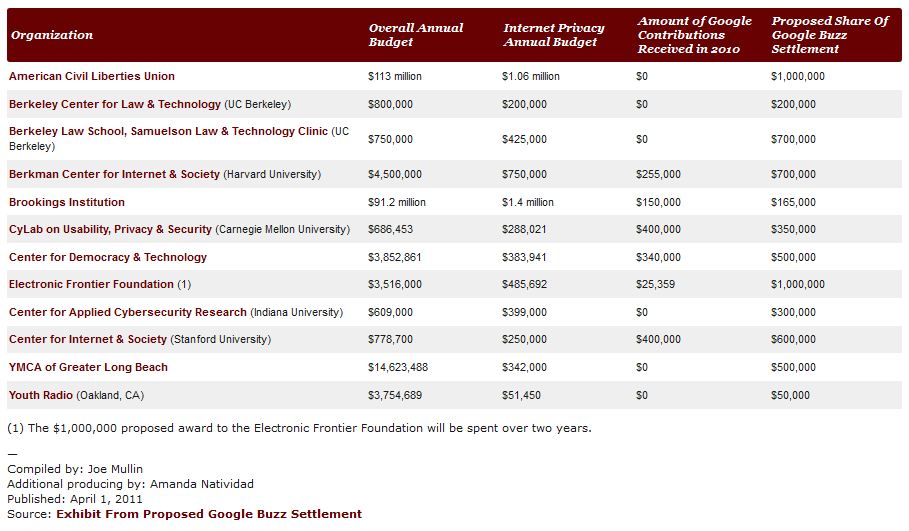PaidContent.org has posted a chart showing “Who’s Getting Buzz Settlement Money.” This refers to the $9.5 million payout following the Federal Trade Commission settlement with Google a class action suit over its “Buzz” social networking service. Last week, the Federal Trade Commission entered into a consent decree with Google over its botched rollout of Buzz saying the search giant violated its own privacy policy. Google will also pay out to various advocacy groups according to the distribution seen in the chart as part of a separate class action. Payouts to advocates like this are not uncommon, although they are more often the result of a class action settlement than a regulatory agency consent decree. [Update/Correction 5:13 pm: I should have made it clear that this payout was the result of a class action lawsuit against Google and not the direct result of the FTC settlement. Apologies for that mistake, but still interested in the questions raised below.]
But that got me wondering whether this might make for good fodder for a case study by a public choice economist or political scientist. There are some really interesting questions raised by settlements like this that would be worth studying.
First, do rewards like this promote agitation with regulatory agencies for consent decrees? Regulatory advocates stand to gain a healthy cut of any final settlement, so it seems likely that they would seek such regulatory actions. It’s noteworthy that, according to Computer Business News, “The Electronic Privacy Information Center (EPIC) has filed an objection to agreements Google has reached over its social network Buzz because it is not one of the beneficiaries of the privacy fund set up by Google.” Apparently EPIC wants a $1.75 million cut. [Recall that EPIC wanted Google’s Gmail banned when it came out back in 2004.] The ACLU, EFF, and CDT all made out handsomely from the settlement, too, and they have been among the primary cheerleaders for a new Internet regulatory regime in the name of protecting privacy.
Second, shouldn’t this settlement money go to consumers who were supposedly harmed instead of to these regulatory advocates? Of course, finding and making whole a massive class of potentially aggrieved consumers would be extremely difficult and costly, especially because of the amorphous nature of the “harm” in question with something like Buzz. And so we instead get the payouts to the privacy regulatory advocates. The theory is that transferring money to these surrogates is the next best thing because they will stand up on consumers’ behalf in the future. I’m not so sure. Privacy is a highly amorphous value and these regulatory advocates almost certainly do not represent the varied interests of all consumers.
Anyway, if you are an aspiring public choice econ or poly sci PhD student, this might make for an interesting study. It would be interesting to see how this money is spent and how much more aggressive these groups become in their push for privacy-related investigations/regulation when there is a nice pot of gold at the end of that particular rainbow.


 The Technology Liberation Front is the tech policy blog dedicated to keeping politicians' hands off the 'net and everything else related to technology.
The Technology Liberation Front is the tech policy blog dedicated to keeping politicians' hands off the 'net and everything else related to technology.